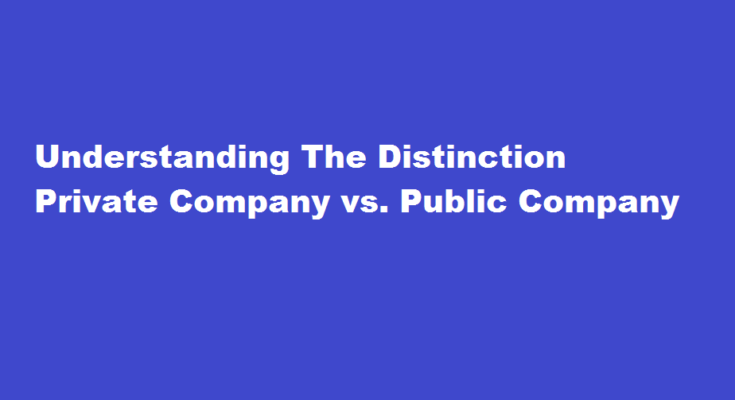Introduction
The world of business is diverse, offering various types of companies with different structures and regulations. Two key classifications are private companies and public companies. Understanding the differences between these entities is crucial for investors, employees, and entrepreneurs alike. In this article, we will explore the unique characteristics that set private and public companies apart, shedding light on their ownership, financial reporting, governance, and overall dynamics.
Ownership Structure
One of the fundamental differences between private and public companies lies in their ownership structure. A private company is typically owned by individuals, families, or a small group of investors. Ownership is often closely held, with shares held by a limited number of people. In contrast, a public company is owned by the general public, with shares listed and traded on a stock exchange. Public companies raise capital by issuing shares to the public, allowing anyone to become a shareholder.
Financial Reporting
Another important aspect of differentiation is the financial reporting requirements. Private companies have more flexibility in this regard, as they are not subject to the same level of scrutiny as public companies. They are not obligated to disclose financial information to the public, although they may still need to share it with relevant stakeholders or regulatory bodies. Public companies, on the other hand, must adhere to stringent reporting standards and regulations, providing regular financial statements and other disclosures to ensure transparency and accountability.
Governance and Decision-making
Governance structures in private and public companies also diverge significantly. Private companies tend to have a more centralized decision-making process, with ownership concentrated in the hands of a few individuals or a single entity. This allows for quick decision-making and agility in implementing strategies. Public companies, however, operate under a more complex governance structure. Shareholders, who have voting rights based on their shareholdings, elect a board of directors to oversee the company’s management. This separation of ownership and management introduces a higher level of checks and balances.
Access to Capital
Access to capital is another crucial distinction between private and public companies. Private companies typically rely on personal funds, loans, or investments from a select group of individuals or venture capitalists. They have limited avenues for raising substantial amounts of capital quickly. Public companies, on the other hand, have the advantage of accessing capital through the public market. By issuing stocks or bonds, they can generate significant funds to finance growth initiatives, acquisitions, or research and development projects.
Risk and Liability
The level of risk and liability also varies between private and public companies. In a private company, the liability is often limited to the owners and shareholders. They bear the responsibility for any debts or legal obligations of the company. Public companies, however, are subject to higher scrutiny and legal requirements. Shareholders’ liability is generally limited to their investment, protecting them from excessive personal risk. The board of directors and executives, however, may face personal liability in certain circumstances.
Frequently Asked Questions
What is the most important distinction between a private company and a public company?
A public company is one that sells shares to the public at large, usually on a market like the New York Stock Exchange. A private company is one that does not sell shares of stock to the public at large and instead keeps its ownership to a small group of founders, institutions, accredited investors and employees.
What are the three 3 differences between a public company and private company?
The main categories of difference are trading of shares, ownership (types of investors), reporting requirements, access to capital, and valuation considerations
Conclusion
Distinguishing between private and public companies is crucial for individuals involved in the business world. Private companies offer flexibility, confidentiality, and a more centralized decision-making process, while public companies provide access to capital, transparency, and increased scrutiny. Understanding these differences empowers entrepreneurs, investors, and employees to make informed decisions aligned with their goals and preferences. By comprehending the unique dynamics of each type, stakeholders can navigate the business landscape more effectively and efficiently.
Read Also : A Step-by-Step Guide to Registering a Private Limited Company



